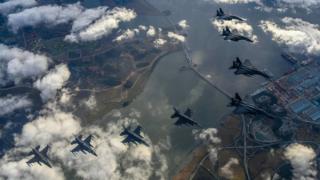On Wednesday 14 June, the Yoon Suk-yeol administration of South Korea released its National Security Strategy (NSS). The document pledges to make Korea a “global pivotal state” that plays a more influential role in “defending liberal democracy and contributing to global prosperity.” The NSS continues the Yoon administration’s strategic re-alignment with traditional allies and partners such as the United States and Australia in the face of ongoing North Korean missile tests and diplomatic tensions with China.
What is South Korea’s National Security Strategy?
The 2023 National Security Strategy sets out how the Yoon administration views the current international security environment; what it regards as security priorities across government ministries encompassing diplomacy, defence, trade, technology and more; and how its various lines of effort and policies fit together to fulfil its national security objectives. As such, national security strategies guide the formulation of other documents such as region-specific strategies like Seoul’s new Indo-Pacific Strategy as well as department-specific policies such as foreign policy white papers or mid-term defence plans.
How does this NSS differ from other countries’ versions?
Unlike the United States where presidents may release an interim NSS to signal their priorities early on and sometimes an updated NSS in their second term to reflect changing events, South Korea has a single, five-year presidential term meaning the NSS has outsized importance. Other US allies and partners have recently released national security strategies, such as Japan’s second NSS in 2022 and Germany’s first ever NSS in June 2023. These documents seek to draw the big picture, as it were, of where their country sits in the global order. Australia does not currently publish a National Security Strategy; the last was released under Julia Gillard’s government in 2013.
What are the key takeaways of relevance to the United States?
The NSS emphasises the strengthening of the Korea-US alliance in recent months as reflected in President Biden’s visit to Seoul last year and President Yoon’s state visit to Washington in April this year. That visit led to the joint Washington Declaration with new initiatives for strengthening combined deterrence against North Korea. The NSS also highlights the rapid progress in Korea-US-Japan trilateral cooperation made possible by the improving Korea-Japan relationship. Finally, the NSS makes strong reference to the values of freedom, democracy and solidarity as being central to Korea’s place in the world, and the need to stand with like-minded countries. This is a departure from the strategic ambiguity of previous administrations that tried to downplay a values-based agenda.
Is there anything about Australia in Korea’s new NSS?
This NSS devotes more attention to Australia than any NSS to date. The Yoon administration’s NSS refers to the importance of Australia as a crucial partner on economic security, trusted supply chains for critical minerals, renewable energy and climate change mitigation, and defence industry. Australia is also cited as an influential regional actor in terms of its alliance with the United States and participation in minilateral groupings like the Quad and AUKUS, all of which are being keenly watched in Seoul. In sum, the NSS puts a lot of new opportunities on the table for how Korea can cooperate with the United States, Australia and other like-minded partners in configurations beyond purely bilateral relationships.
For more about South Korea’s new National Security Strategy, you can read Dr Lee’s recent commentary, available here: “Seoul’s new national security strategy flips the script, Korean style” at The Strategist.






